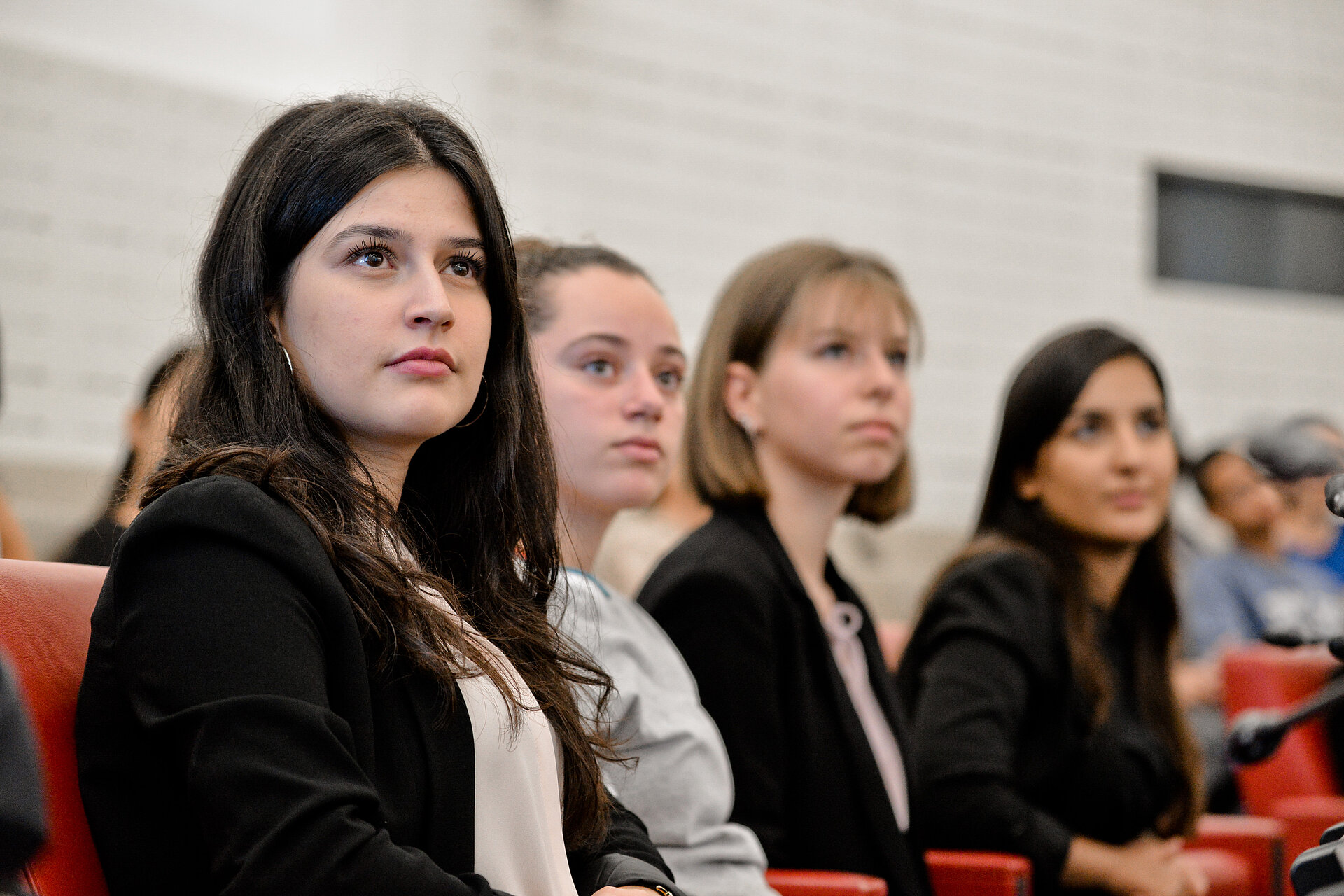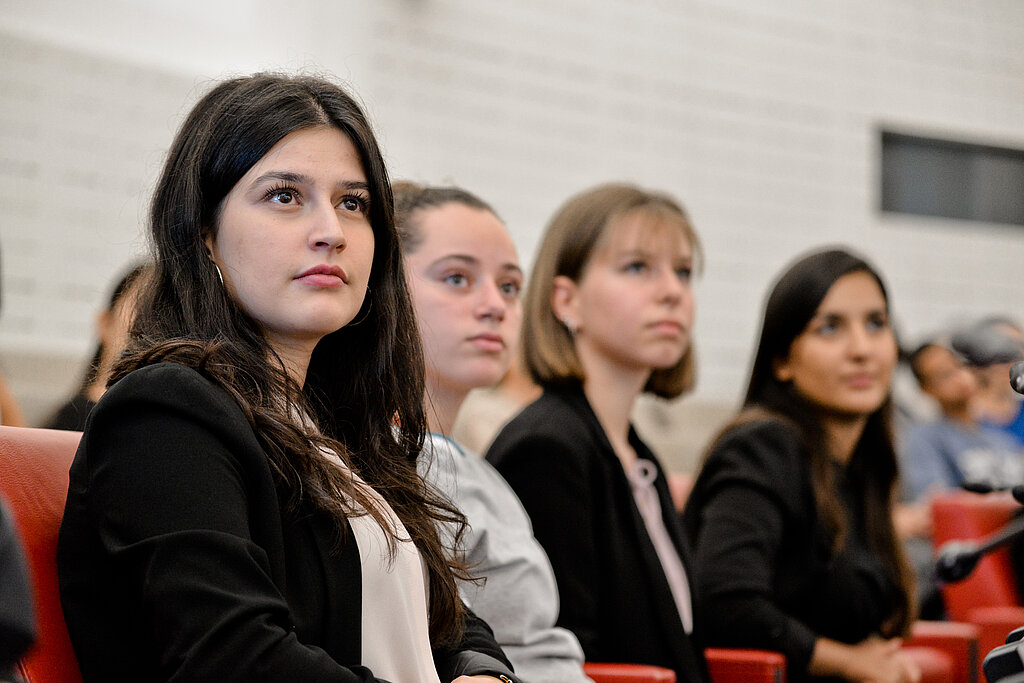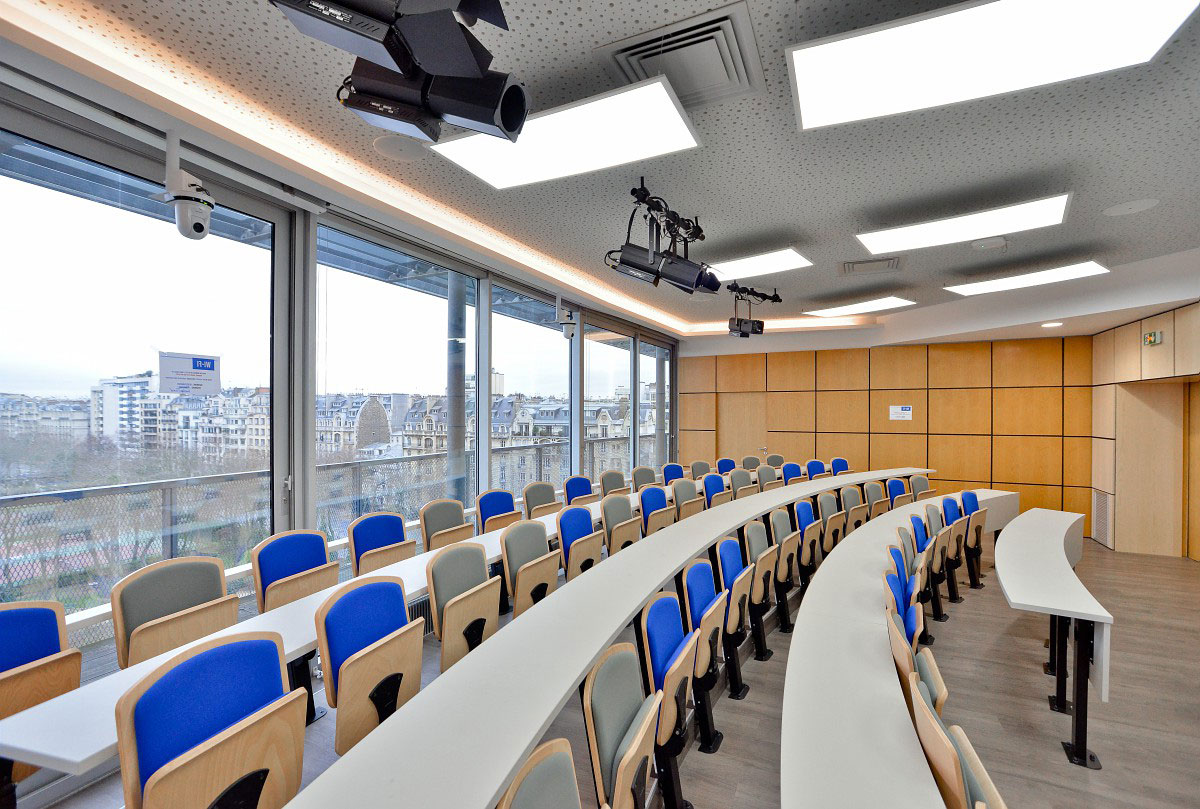Program Year
Obligatoire pour apprentissage - 6 ECTS
- Livret
Livret
Ects : 6
Overview :
Le premier Livret, remis à mi-parcours, présente l'entreprise ou l'institution d'accueil et son environnement ; il décrit les missions et fixe les objectifs pour la seconde période de l'apprentissage.
Coefficient : 6
Recommended prerequisites :
Aucun
Require prerequisites :
Aucun
Learning outcomes :
Restitution des missions effectuées lors de la première période de l'apprentissage.
Assessment :
Note du livret
Bibliography-recommended reading
Sans objet
- Initiation à R
Initiation à R
Lecturer :
MARIE BESSECTotal hours : 9
Overview :
Présentation des bases de langage et outils essentiels à l’utilisation du logiciel R (avec l'interface RStudio): préparation et manipulation des bases de données, éléments basiques de programmation, traitements statistiques simples des données (statistiques descriptives, représentations graphiques, régression linéaire,... ).
Learning outcomes :
Savoir réaliser des analyses statistiques et économétriques de base sur des données à l’aide du logiciel R.
Obligatoire pour formation continue - 6 ECTS
- Mémoire
Mémoire
Ects : 6
Coefficient : 6
- Initiation à R
Initiation à R
Lecturer :
MARIE BESSECTotal hours : 9
Overview :
Présentation des bases de langage et outils essentiels à l’utilisation du logiciel R (avec l'interface RStudio): préparation et manipulation des bases de données, éléments basiques de programmation, traitements statistiques simples des données (statistiques descriptives, représentations graphiques, régression linéaire,... ).
Learning outcomes :
Savoir réaliser des analyses statistiques et économétriques de base sur des données à l’aide du logiciel R.
Optionnel - 24 ECTS à choisir
- Introduction à l'évaluation des politiques publiques
Introduction à l'évaluation des politiques publiques
Ects : 3
Lecturer :
YOHAN RENARDTotal hours : 4.5
Overview :
Ce cours se décline en deux axes principaux. Le premier s’intéresse aux méthodes d’évaluation ex post c’est-à-dire aux méthodes qui cherchent à mesurer l’impact effectif d’une intervention ayant été mise en oeuvre. Ces méthodes font principalement appel à l’économétrie, en portant une attention particulière à la question de l’identification de liens de causalité. Plusieurs méthodes seront présentées : les méthodes expérimentales (essais randomisés contrôlés) et non expérimentales (variables instrumentales, régressions sur discontinuité, appariement et doubles différences). Le second axe s’intéresse aux méthodes d’évaluation ex ante c’est-à-dire aux méthodes qui cherchent à anticiper l’impact d’une intervention que l’on envisage de mettre en oeuvre. Ces méthodes font principalement appel à la construction de modèles de simulations, notamment les MEGC et les modèles de microsimulation et portent une attention particulière à la description des mécanismes de transmission des effets des interventions analysées.
Coefficient : 3
- Concepts et outils d'analyse de la pauvreté et des inégalités
Concepts et outils d'analyse de la pauvreté et des inégalités
Ects : 3
Lecturer :
FLORE GUBERTTotal hours : 21
Overview :
A partir de données individuelles portant sur un pays en développeemnt ou en transition (enquêtes ménages, enquêtes emploi, etc.), les étudiants apprendront à manier différents indicateurs de bien-être, établir un profil de pauvreté et analyser les inégalités intra-pays. L'objectif est que que les étudiants élaborent un diagnostic de la pauvreté et des inégalités au sein d'un pays susceptible d'aider à la formulation de politiques de réduction de la pauvreté.
Coefficient : 3
- Méthodes empiriques d'analyse des politiques de développement
Méthodes empiriques d'analyse des politiques de développement
Ects : 3
Lecturer :
ELODIE DJEMAITotal hours : 21
Overview :
Ce cours a un objectif double. Concevoir et comprendre les enjeux des différentes politiques de lutte contre la pauvreté. Aller au-delà de l’approche statique : analyse des évolutions de la pauvreté et des inégalités, analyse des trappes de la pauvreté et de leurs facteurs explicatifs. Les outils mobilisés dans ce cours donnent des clés en vue de définir des politiques de développement efficaces en analysant les inégalités intra-pays en termes de vulnérabilité, de pauvreté, d’accès au marché du travail, de santé ou d’éducation par exemple. Ces outils sont également pertinents pour les pays de l’OCDE. A l’issue du cours les étudiants auront acquis des compétences dans l’utilisation des données de panel individuelles, auront été capables de mettre en oeuvre des concepts théoriques visant à mieux comprendre la dynamique de la pauvreté et les inégalités dans des pays à faible revenus. L’évaluation permettra aux étudiants de reproduire des analyses économétriques telles que préconisées par les institutions internationales dans leurs Poverty Assessment Studies.
Coefficient : 3
- Financial Markets
Financial Markets
Ects : 3
Lecturer :
FRANCOIS-XAVIER CHAUCHATTotal hours : 21
Overview :
L'objectif de cet enseignement est de comprendre les relations entre les fluctuations des marchés financiers et les évolutions économiques. Le cours traite du rôle des marchés financiers dans l'économie mondiale. Les notions de base, économiques et financières, sont présentées pour comprendre et suivre les évolutions des grands marchés financiers internationaux. Le cours porte également sur l’évolution de la croissance des marchés financiers dans les pays émergents.
Coefficient : 3
- Pourquoi l’accord de Paris n’a pas mis fin au réchauffement climatique : économie et géopolitique des enjeux environnementaux
Pourquoi l’accord de Paris n’a pas mis fin au réchauffement climatique : économie et géopolitique des enjeux environnementaux
Ects : 3
Lecturer :
ETIENNE ESPAGNETotal hours : 21
Overview :
Ce cours vise à familiariser les étudiants avec les enjeux économiques et le cadre de gouvernance internationale sur les enjeux environnementaux et climatiques. Il vise à expliquer les enjeux de politique publique liés aux problèmes environnementaux, avec un focus sur les enjeux liés au changement climatique, en particulier sous l’angle économique et sous celui des relations internationales.
Coefficient : 3
- Méthodes et données de l'analyse macroéconomique
Méthodes et données de l'analyse macroéconomique
Ects : 6
Lecturer :
FABIEN TRIPIERTotal hours : 39
Overview :
Ce cours offre les bases de la macroéconométrie comptemporaine et leurs applications en termes d’analyse économique et de prédiction des séries temporelles. Le cours se divise en deux blocs. Le premier couvre une présentation des modèles VAR (Vector Auto-Regressive Models) et leurs applications. Ces modèles sont purement statistiques et ne reposent pas sur de la théorie économique, mais possèdent un grand intérêt pour montrer les liens qui unissent des séries temporelles de façon agnostique. Le cours couvrira les VAR simples, les VAR restreints et les VAR bayésiens (BVAR). Le deuxième bloc concerne une présentation des modèles DSGE (Dynamic Stochastic General Equilibrium) qui eux réposent sur la théorie économique. Ces modèles ont récemment colonisé les institutions internationales sur la dernière décennie et offrent des alternatives en termes de prédiction et d’analyse économique. Ces modèles seront estimés par des méthodes bayésiennes. Le cours est très appliqué et sera fait sur MATLAB.
Coefficient : 6
Recommended prerequisites :
Savoir programmer dans n'importe quel langage de programmation.
Require prerequisites :
Avoir suivi la remise à niveau MATLAB.
Learning outcomes :
Comprendre le principe de forecasting, d'estimation d'un modèle, comparaison de la performance du modèle contre un autre, etc.
Assessment :
Un dossier à rendre.
- Comptes nationaux
Comptes nationaux
Ects : 3
Lecturer :
FRANCOIS LEQUILLERTotal hours : 21
Overview :
- Le PIB - Les grands agrégats - Comparaisons internationales - Méthodes et sources des équilibres ressources/emplois - PIB et Bien-être - PIB et mondialisation
- Comprendre les données macroéconomiques pour pouvoir les utiliser à bon escient.
Coefficient : 3
Learning outcomes :
- Définitions de base - Connaissance des limites des données - Savoir où trouver les variables
- Risque pays
Risque pays
Ects : 6
Lecturer :
SYLVAIN BELLEFONTAINETotal hours : 42
Overview :
Ce cours a pour objectifs de présenter les principes de l'analyse du risque-pays permettant aux étudiants d'appliquer un ensemble de concepts théoriques et d'outils méthodologiques, à l'appui d'études de cas ; d'exposer la méthodologie de la notation souveraine pratiquée par les agences financières internationales et de débattre du rôle des agences de notation.
Coefficient : 6
- Machine Learning
Machine Learning
Ects : 6
Lecturer :
FABRICE ROSSITotal hours : 36
Overview :
The course gives a thorough presentation of the machine learning field and follows this outline:
- general introduction to machine learning and to its focus on predictive performances (running example: k-nearest neighbours algorithm)
- machine learning as automated program building from examples (running example: decision trees)
- machine learning as optimization: empirical risk minimizationlinks with maximum likelihood estimationsurrogate losses and extended machine learning settingsregularisation and kernel methods (support vector machines)
- reliable estimation of performances: over fittingsplit samplesresampling (leave-one-out, cross-validation and bootstrap)ROC curve, AUC and other advanced measures
- combining models: ensemble techniquesbagging and random forestsboosting
- unsupervised learning: clustering (hierarchical clustering, k-means and variants, mixture models, density clustering)outlier and anomaly detection
Coefficient : 2 6 (M2 Economie Internationale et Développement) 6 (M2 Diagnostic économique international)
Require prerequisites :
- intermediate level in either Python or R. Students are expected to be able to perform standard data management tasks in Python or R, including, but not limited to: loading a data set from a CSV filerecoding and cleaning the data set implementing a simple data exploration strategy based on pivot table and on graphical representation
- intermediate level in statistics and probability. Students are expected to be familiar with: descriptive statisticsconditional probabilities and conditional expectationscore results from statistics: bias and variance concepts, strong law of large numbers, central limit theorem, etc.
Learning outcomes :
After attending the course the students will
- have a good understanding of the algorithmic and statistical foundations of the main machine learning techniques
- be able to select machine learning techniques adapted to a particular task (exploratory analysis with clustering methods, predictive analysis, etc.)
- be able to design a model selection procedure adapted to a particular task
- report the results of a machine learning project with valid estimation of the performances of their model
Assessment :
- quizzes and tests during the course
- machine learning project
Obligatoire pour apprentissage - 21 ECTS
- Livret
Livret
Ects : 12
Coefficient : 12
- Economie internationale appliquée
Economie internationale appliquée
Ects : 3
Lecturer :
FLORIAN ROGERTotal hours : 30
Overview :
L'objectif du cours est de fournir aux étudiants les clés nécessaires à la réalisation de diagnostics conjoncturels. Il vise ainsi à : permettre aux étudiants d'interpréter les principaux indicateurs conjoncturels ; expliquer les spécificités économiques des différentes zones géographiques (Etats-Unis, Zone euro et pays émergents) ; revenir sur les cycles/faits économiques contemporains ; apprendre aux étudiants à construire un scénario économique pour le traduire en termes de positions d'investissements et d'allocations d'actifs sur les marchés.
Coefficient : 3
- Crises et politiques publiques
Crises et politiques publiques
Ects : 6
Lecturer :
SABINE MAGE-BERTOMEU
AUDE SZTULMANTotal hours : 34.5
Overview :
Cet enseignement est un cycle de conférences pluridisciplinaire qui vise à appréhender la réalité de différents types de crises et à analyser les réponses proposées par les politiques publiques. Le séminaire accueille des intervenants du monde académique et des milieux socio-économiques pour une diversité de points de vue et d’acteurs. Les principales thématiques sont : crise environnementale, crise politique, crise des dettes publiques, crise sanitaire, crise sociale, crise des relations internationales, crise migratoire... Le séminaire repose sur la participation active des étudiants. Plusieurs séances sont consacrées à l'encadrement de la réalisation du mémoire dont le sujet est choisi par les étudiants (revue de la littérature, problématique, plan, etc.).
Coefficient : 6
Recommended prerequisites :
Aucun
Require prerequisites :
Aucun
Learning outcomes :
Préparer et animer une conférence. Travailler en groupe. Prendre la parole en public. Définir un sujet de mémoire et formuler une problématique. Réaliser un mémoire de recherche.
Assessment :
Préparation et animation de la conférence : 20%. Mémoire : 45%. Présentation du mémoire : 35%.
Bibliography-recommended reading
Des références bibliographiques sont mises à disposition des étudiants avant chaque conférence.
Obligatoire pour formation continue - 21 ECTS
- Mémoire
Mémoire
Ects : 12
Coefficient : 12
- Economie internationale appliquée
Economie internationale appliquée
Ects : 3
Lecturer :
FLORIAN ROGERTotal hours : 30
Overview :
L'objectif du cours est de fournir aux étudiants les clés nécessaires à la réalisation de diagnostics conjoncturels. Il vise ainsi à : permettre aux étudiants d'interpréter les principaux indicateurs conjoncturels ; expliquer les spécificités économiques des différentes zones géographiques (Etats-Unis, Zone euro et pays émergents) ; revenir sur les cycles/faits économiques contemporains ; apprendre aux étudiants à construire un scénario économique pour le traduire en termes de positions d'investissements et d'allocations d'actifs sur les marchés.
Coefficient : 3
- Crises et politiques publiques
Crises et politiques publiques
Ects : 6
Lecturer :
SABINE MAGE-BERTOMEU
AUDE SZTULMANTotal hours : 34.5
Overview :
Cet enseignement est un cycle de conférences pluridisciplinaire qui vise à appréhender la réalité de différents types de crises et à analyser les réponses proposées par les politiques publiques. Le séminaire accueille des intervenants du monde académique et des milieux socio-économiques pour une diversité de points de vue et d’acteurs. Les principales thématiques sont : crise environnementale, crise politique, crise des dettes publiques, crise sanitaire, crise sociale, crise des relations internationales, crise migratoire... Le séminaire repose sur la participation active des étudiants. Plusieurs séances sont consacrées à l'encadrement de la réalisation du mémoire dont le sujet est choisi par les étudiants (revue de la littérature, problématique, plan, etc.).
Coefficient : 6
Recommended prerequisites :
Aucun
Require prerequisites :
Aucun
Learning outcomes :
Préparer et animer une conférence. Travailler en groupe. Prendre la parole en public. Définir un sujet de mémoire et formuler une problématique. Réaliser un mémoire de recherche.
Assessment :
Préparation et animation de la conférence : 20%. Mémoire : 45%. Présentation du mémoire : 35%.
Bibliography-recommended reading
Des références bibliographiques sont mises à disposition des étudiants avant chaque conférence.
Optionnel - 9 ECTS à choisir
- VBA pour Excel
VBA pour Excel
Ects : 3
Lecturer :
FREDERIC PELTRAULTTotal hours : 21
Overview :
A l’issue du cours, les étudiants doivent être capables d’automatiser des rapports sous Excel. Les points suivants sont abordés : Prise en main de VBA et généralités sur les macros ; Les principales propriétés et méthodes des objets d’Excel ; Les fonctions des bibliothèques Excel et VBA ; Les fonctions personnalisées ; Les formules ; Les boucles & les structures conditionnelles ; Les tris et la recherche de données ; Le solveur ; Les simulations ; Les interfaces (Userform). Le cours s’appuie sur une quinzaine d'exercices qui permettent d'aborder progressivement les différentes notions.
Coefficient : 3
Recommended prerequisites :
Une bonne maîtrise d'Excel est recommandée pour ce cours.
Learning outcomes :
Automatiser un tableau de bord avec VBA.
Faire des calculs avec VBA
Optimiser avec VBA
Simuler avec VBA
Assessment :
Examen en salle informatique.
- Union européenne : politique macroéconomique et intégration financière
Union européenne : politique macroéconomique et intégration financière
Ects : 3
Lecturer :
PAOLA MONPERRUS-VERONITotal hours : 21
Overview :
Le cours vise à expliquer la finalité et la logique de la construction européenne afin de comprendre les défis et les implications pratiques pour l'économie réelle, le secteur financier et les modèles sociaux nationaux. Il illustre le processus décisionnel en se focalisant sur trois principaux domaines de gouvernance : union budgétaire, union monétaire et union bancaire. Le cours s'attache également à comprendre les transformations intervenues au cours des différentes étapes de l'intégration. Enfin, l'incomplétude des institutions permet d'illustrer la menace qui pèse sur le projet européen.
Enseignant responsable : Paola Monperrus
Coefficient : 3
Learning outcomes :
Connaître le rôle et le fonctionnement des principales institutions européennes, les fondamentaux de la supervision budgétaire, de la politique monétaire, de l'Union bancaire et de l'assistance financière aux pays en crise.
- Diagnostic de court terme et nowcasting
Diagnostic de court terme et nowcasting
Ects : 3
Lecturer :
MARIE BESSECTotal hours : 21
Overview :
Ce cours vise à maîtriser les outils utilisés par les conjoncturistes en vue de faire de la prévision de court terme (ou nowcasting) des variables macroéconomiques. Nous présenterons d’abord les modèles de prévision linéaires classiques et les techniques d’évaluation des prévisions. Nous indiquerons ensuite comment ces outils peuvent être adaptés afin de prendre en compte des gros volumes d’information (modèles à facteurs, algorithmes de sélection et combinaisons). Nous introduirons aussi des modélisations multi-fréquentielles (MIDAS, bridge) qui permettent au prévisionniste d’intégrer dans son diagnostic les signaux d’indicateurs de fréquence élevée. Enfin, des modèles à changement de régime et certaines techniques du machine learning permettront de prendre en compte des liaisons plus complexes entre la variable prévue et les prédicteurs et de qualifier l’état conjoncturel. Ces outils seront illustrés sur des cas pratiques avec le logiciel Matlab.
Coefficient : 3
Require prerequisites :
Econométrie des séries temporelles ; programmation sous Matlab
Learning outcomes :
Construction de modèles de prévision variés ; application sous Matlab
Assessment :
Examen avec Matlab
Bibliography-recommended reading
- Ghysels, M. Marcellino. Applied Economic Forecasting using Time Series Methods, Oxford University Press, 2018.
- Timmermann, A. Elliott, G. Economic Forecasting, Princeton University Press, 2016.
- Macroéconomie de la transition énergétique
Macroéconomie de la transition énergétique
Ects : 3
Total hours : 21
Coefficient : 3
Academic Training Year 2024 - 2025 - subject to modification
Teaching Modalities
The program consists of around 400 hours of instruction between September and March.
The program is designed to offer a balance between theory and practice in both its content and its instructional methods. Classes work in small groups to encourage active pedagogy in the form of group work, projects, presentations, and so on.
The program offers a large number of electives, 30% of which are taught in English.
The year is structured on a rotational model, according to the following pattern:
- From September to March: 3 days at work, 2 days on campus;
- From April to September: full-time work.
Students do their rotations in a wide range of institutions in the private and public sector.
The apprenticeship is reviewed in regular meetings with an academic tutor and an apprenticeship mentor and results in two assignments and a thesis defense.
- The first mid-apprenticeship assignment presents the host company or institution and its environment; it describes the goals and projects for the second half of the apprenticeship.
- The second assignment is an economic thesis based on one or more of these projects; it also contains a summary of the apprenticeship. Students must then defend the thesis.
Internships and Supervised Projects
Continuing education students must complete an internship of at least three months. They can do so at their current place of work.
Teaching Staff
Sylvain BELLEFONTAINE
Senior economist / AFD
Marie BESSEC
Associate Professor
François-Xavier CHAUCHAT
Economist / DORVAL-AM
Elodie DJEMAI
Associate Professor
Anne Epaulard
University Professor
Clément Gilles
Economist / Société Générale
Hugo Lapeyronie
Researcher at AFD (Agence Française de Développement)
François LEQUILLER
Consellor to Director of statistics / OECD
Sabine MAGE-BERTOMEU
University Professor
Marta MENENDEZ
Associate Professor
Paola MONPERRUS-VERONI
Economiste zone euro / Crédit Agricole
Etienne Espagne
Senior economist / AFD
Frédéric PELTRAULT
Associate Professor
Marc Raffinot
Senior Associate Professor
Florian ROGER
Head of Research / Exane Derivatives
Aude SZTULMAN
Associate Professor
Fabien Tripier
University Professor
Sarah N'SONDE
Head of Sector Analysis / COFACE
Stéphane COLLIAC
Senior economist / BNP Paribas
Research-driven Programs
Training courses are developed in close collaboration with Dauphine's world-class research programs, which ensure high standards and innovation.
Research is organized around 6 disciplines all centered on the sciences of organizations and decision making.
Learn more about research at Dauphine








